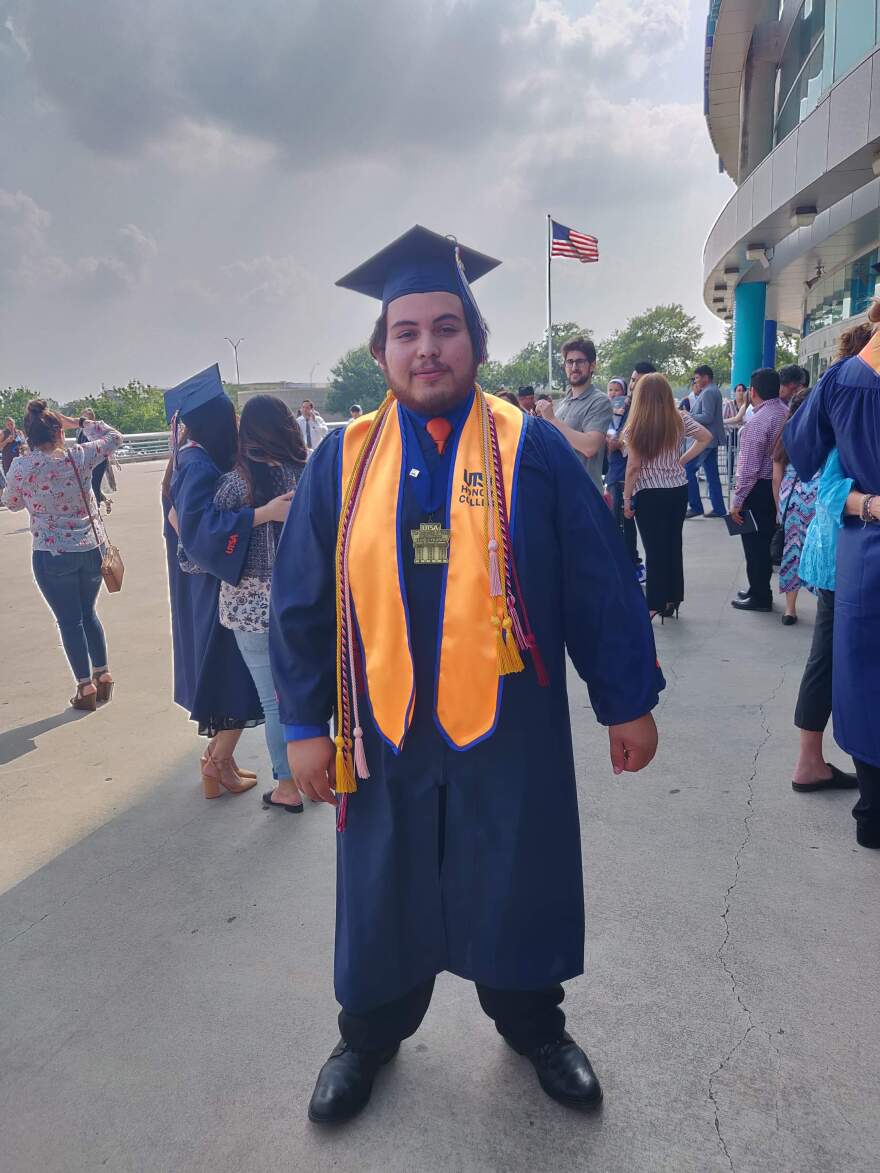Oscar Cantua was one of 5100 graduates at the University of Texas at San Antonio’s 2019 Spring Commencement. He received an undergraduate degree in physics. It stemmed from an early interest in black holes. But his path to graduation was a rocky one. Oscar, his mother and his older sister left Mexico when he was only five.
“She’s been working factory jobs, very manual labor jobs since she was a young girl,” Cantua said. “She wanted us to have an opportunity to have higher paying jobs, jobs that wouldn’t require us to be on our feet 24/7.”
The family ended up in Sinton, Texas, about 26 miles north of Corpus Christi. They stayed with a family friend.
“I came in the middle of the school year, but fortunately I had been going to a bilingual school in Mexico, so I was able to communicate with all the kids,” Cantua said. “The majority of my school were actually of some sort of Hispanic, Latino origin, so I was able to make friends pretty quickly, especially being [the] new kid and being able to talk in Spanish, being from Mexico. It was certainly easier than it could have been.”
Cantua is a U.S. citizen through his father, who was born in Oakland, Calif. His mother and sister are Mexican citizens. Cantua’s sister is about seven years older, and her father died before Cantua was born.

Cantua says his mother’s deportation came out of the blue, just as he finished his sophomore year. He and his mother had made a trip to Corpus Christi to find him a laptop.
“On the way back, we were about to turn into the road that my house was on,” he said. “She ended up getting into the turning lane without signaling. Immediately we saw cop lights.”
Cantua said his mother was nervous — she didn’t know much English, and Cantua was translating for her.
“I don’t know if he didn’t like that," he recalled, "but he asked her to step out of the vehicle and ordered me to stay inside. I didn’t know what was happening until he was putting her in handcuffs for some reason.”
Cantua’s sister decided to return to Mexico after she graduated from high school.
“She was trying to go to college, but we didn’t have the money,” said Cantua. “DACA came into effect literally the year after she graduated, so she decided to just go back to Mexico with her family.”

Instead of following his family back across the border, Cantua made the decision to stay in Sinton and finish school. His father, who lives in McAllen, offered to take him in.
“But...I was so used to Sinton and had built up a decent reputation in the school,” Cantua said. “I had a lot of extracurriculars. So there [were] a lot of things I would have had to sacrifice in order to move somewhere else.”
Cantua’s fascination with black holes began in sixth grade. He knew by middle school he would major in physics, but Cantua would have to find a way to leap the financial hurdle to get to college.
He applied for the at the University of Texas at San Antonio. It’s a merit-based four-year scholarship that includes tuition, fees, room & board, and auto-enrollment in an honors program. He got the scholarship and found himself under the mentorship of Eric Schlegel, Vaughan Family Professor of Physics & Astronomy at UTSA. Schlegel gained fame for the discovery a in 2016. Schlegel put Cantua on a path to a future career in academia in astrophysics and research.
Cantua says his mother, like most mom’s, worries whether he can make a living, but mostly wants him to be happy.
“She always worries. ‘Is there actually money in this? Are you going to be starving?’ I tell her no. It might take a while but it’s a comfortable life. Even if I get paid on one of the lower ends, that’s a lot more than we’re used to.”
Cantua left for Mexico right after graduation to spend time with his family. He says he’ll take a year off and start applying to graduate school with a goal of getting a Ph.D.
Norma Martinez can be reached at Norma@TPR.org and on Twitter at .
Lauren Terrazas can be reached at Lauren@TPR.org and on Twitter at .
Copyright 2020 Texas Public Radio. To see more, visit . 9(MDAxODQzOTgwMDEyMTcyNjI4MTAxYWQyMw004))







